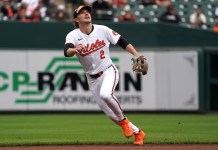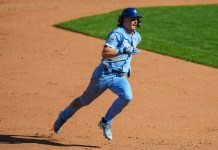The 19-win difference between the Houston Astros and Philadelphia Phillies in the regular season is the second-biggest of all-time for World Series participants. Only the 1906 all-Chicago World Series between the Cubs and White Sox had a biggest discrepancy. The biggest one in recent memory was back in 2019, when the Washington Nationals faced the vaunted Astros and won Game 7 on the road in Houston to earn the first World Series title in franchise history.
The Phillies will hope to channel some of that magic as they get ready for unquestioned best team in the American League in this year’s Fall Classic, which begins on Friday night in the Lone Star State. Philadelphia is 9-2 in the playoffs, having swept the Cardinals and then going 7-2 against the Braves and Padres. The Astros are a perfect 7-0, sweeping the Mariners and Yankees.
Top MLB Resources:
Under the old playoff format, the Phillies would not have made it. They were the last team to clinch a spot and were the third wild card behind the Mets and Padres. As this year’s “Team of Destiny”, they face long odds to pull a third straight upset.
Philadelphia Phillies (%plussign% 160) vs. Houston Astros (-185)
Starting pitching
Rotations have not officially been announced, but with the long layoff between the LCS and the WS, we can reasonably assume we’ll see Zack Wheeler vs. Justin Verlander in Game 1, Aaron Nola vs. Framber Valdez in Game 2, Cristian Javier vs. Ranger Suarez in Game 3, Lance McCullers Jr. vs. Noah Syndergaard in Game 4 and then rematches in Games 5 and 6. We do have two travel days built into this series, unlike what the schedule looked like for the LCS.
With both LCS series wrapping up on Sunday, the pitchers are all going to have extended layoffs between starts. Fortunately, the off days will allow for some sim games and side sessions to stay sharp. Teams will have very tailored plans for what they want their arms to do. Frankly, I’d be less worried about the starters and more worried about the relievers, who are used to working a lot of games in short periods of time, but now have four full off days, assuming they get into Friday’s game.
The Astros clearly have the starting pitcher edge because of the likely matchups for Games 3 and 4. I cannot imagine we see Bailey Falter in a starting capacity again against an Astros team that was better against lefties than righties. We should see Syndergaard in Game 4, though it’s entirely possible that the Phillies use Wheeler or Nola (whomever starts G1) on short rest depending on where the series stands.
Suarez was a lot more effective in his start against San Diego than he was against Atlanta and came on in relief two days later for the save in Game 5. He is the wild card of this series to me. Wheeler and Nola will be underdogs in the first two games of the series, but the series likely hinges on Game 3. Suarez faced the Astros in his final regular season start and allowed six runs on seven hits, including three homers. Given that the Astros were third in wOBA and wRC %plussign% against lefties in the regular season, that’s the swing game to me.
The Phillies were also much better against lefties, which could help against Valdez in Game 2, but the way he keeps the ball on the ground and limits the long ball makes him a perfect fit for pitching in the postseason when supported by a good defense. That’s precisely what he has behind him.
Bullpen
From a bullpen standpoint, Seranthony Dominguez has been really special for the Phillies with a 15/0 K:BB ratio in 7.2 innings of work. Otherwise, there have been some concerning appearances. Jose Alvarado is another good weapon, but as a lefty, you worry about how he may match up with the three-batter minimum. He’ll likely be tasked with the high-leverage appearances against Yordan Alvarez, so that’s a key matchup to follow.
The Phillies pen has been solid with 15 runs allowed in 42.1 innings of work and 53 strikeouts against 13 walks, but the Astros pen has only allowed three runs (all solo homers) in 33 innings of work with a 42/10 K/BB ratio. Opposing batters are only hitting .127 off of the Astros relief corps. They’re only batting .211 against the Phillies.
Houston’s deeper pitching staff yields an advantage here, but you have to hand it to the Phillies for being a lot better as the season went along — and also here in the postseason. They’ve gotten the timely homers, but the pitching staff has also held up pretty well more often than not.
Hitting
According to the great Sarah Langs of MLB.com, teams that score first are 23-11 in the postseason. Teams with more home runs are 20-5 and 46.2% of the runs in the playoffs have been scored via the HR. Interestingly enough, 49% of the playoff runs last season were scored via the long ball, so if it seems like a lot this season, it still isn’t as much as last season. https://twitter.com/SlangsOnSports/status/1584563632720969729
Still, the long ball has been a preferred scoring method for these two teams. The Astros have hit 12 homers in seven games and the Phillies have hit 16. Philadelphia also has 23 doubles, while the Astros only have 10. Bryce Harper, Kyle Schwarber and Rhys Hoskins have combined for 13 of the 16 homers, with five each from Hoskins and Harper. Harper’s playoff has been the stuff of legend with a .419/.444/.907 slash in 46 plate appearances. Hoskins only has three hits outside of the home runs.
Harper’s performance has carried the Phillies, as the rest of the playoff roster is only batting .211 with 87 strikeouts in 303 at bats. The Hoskins homers have certainly helped, but most of the supporting cast has been dormant. We’ll see if Harper can keep it up, but he could certainly enjoy the Crawford Boxes at Minute Maid Park as evidenced by his game-winning homer in Game 5 against San Diego.
The Astros are only hitting .227 as a team in these playoffs. Jose Altuve is just 3-for-32 and went into Game 4 against New York just 1-for-28. He started the playoffs on an 0-for-25 streak. However, Jeremy Pena and Alex Bregman have picked up the slack (both hitting over .300), and Yuli Gurriel leads the team with 11 hits after one of his worst regular seasons ever. It was the supporting cast that led the Astros to victory over the Yankees, as Yordan Alvarez only had one hit against six strikeouts in the first three games before going 2-for-4 in the elimination game.
Offense is hard to come by in the postseason, as we’ve seen time and time again. That’s why the supporting cast matters and you have to give the edge to the Astros there, even though Harper’s gone nuclear in October.
Fielding is once again another big key to the series. The Astros have struck out 89 of 282 batters faced (31.6%), while the Phillies have struck out 107 of 391 (27.4%). Those extra balls in play have been an issue for the Phillies at times. They’ve only allowed two unearned runs thus far, but the Astros force you to play mistake-free baseball.
The Phillies have struck out in 94 of 391 plate appearances (24%) and the Astros have taken the long walk back to the dugout in 61 of 285 (21.4%). There is tremendous pressure on Philadelphia’s defense here, as the Astros strike out less often at the plate and strike out more in the field.
Add it all up and the Astros should probably be a bigger favorite than -185. This was the second-best pitching staff by HR/9 and the best by HR/FB%. The Phillies need to hit homers, preferably of the multi-run variety, to make this a long series or pull the upset. It could certainly happen, but I’ll be pretty surprised if the Astros don’t win this series.
Pick: Astros -185




